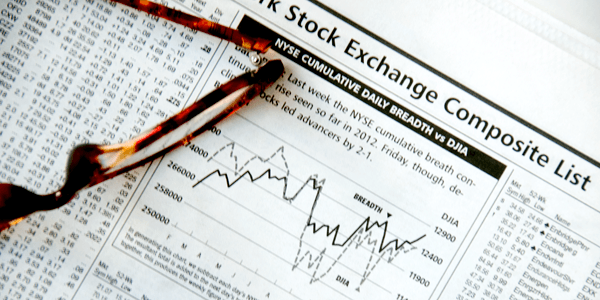Saturday May 4, 2024
Finances

Nike Reports Quarterly Results
Nike, Inc (NKE) reported its fiscal second quarter results on Thursday, December 21. Despite the company reporting better-than-expected earnings, shares fell approximately 12% following release of the report.
Nike posted second quarter net revenue of $13.39 billion. This is up slightly from $13.32 billion reported in the same quarter last year but just under the $13.43 billion in revenue that analysts expected.
"Our Q2 results demonstrated how we are getting back on our front foot in our key areas of innovation and growth," said Nike CEO, John Donahoe. "This quarter showed strong execution by our team as we focus on our winning formula of innovative product, distinctive storytelling and differentiated marketplace experiences. Today we are embracing a company-wide journey to invest in our areas of greatest potential, increase the pace of our innovation, and accelerate our agility and responsiveness."
The company reported net income of $1.58 billion for the quarter, up 19% from net income of $1.33 billion reported last year.
Nike Direct segment sales reached $5.7 billion, up 6% for the quarter. Nike Brand Digital sales were up 4%. Nike’s inventories were $8.0 billion in the quarter, down 14% compared to a year ago. Wholesale revenues were down 2% to $7.1 billion. Nike revised its full-year 2024 guidance downwards and expects fiscal 2024 revenue to grow by 1%. Nike announced that in the three years, it plans to deliver up to $2 billion in cumulative cost savings.
Nike, Inc. (NKE) shares ended the week at $108.57, relatively unchanged for the week.
CarMax, Inc. (KMX) released its third quarter earnings report on Thursday, December 21. The automobile retailer’s shares jumped over 2% following the earnings release.
CarMax reported net sales of $6.15 billion during the quarter, down 5.5% from $6.51 billion in net sales at this time last year. This fell short of analysts’ expected quarterly revenue of $6.35 billion.
“Our third quarter performance reflects the continued efforts of the team that have resulted in several quarters of sequential improvements across key components of our business, despite the persistent widespread pressures in the used car industry,” said CarMax CEO, Bill Nash. “Key results this quarter include year-over-year growth in wholesale units, further SG&A reductions, a strengthened credit mix in CAF’s portfolio, strong retail and wholesale gross profit per unit, and year-over-year growth in profitability.”
The company reported quarterly net income of $82.0 million or $0.52 per adjusted share. This was up from $37.6 million or $0.24 per adjusted share one year ago.
CarMax sold 302,666 vehicles in the quarter, an increase of more than 1.3% from the same time last year. CarMax’s retail used sales declined by almost 3% to 174,766 vehicles. The company’s comparable store used sales decreased 4.1%. CarMax attributed the decline to inflationary pressures, rising interest rates, tighter borrowing standards and low consumer confidence. The company announced plans to add four locations during the fourth quarter of fiscal 2024.
CarMax, Inc. (KMX) shares ended the week at $76.74, relatively unchanged for the week.
Paychex, Inc., (PAYX) released its second quarter earnings on Thursday, December 21. While the payroll service provider reported increased revenue, its shares fell more than 6% following the release of the report.
For the quarter, the company reported total revenue of $1.26 billion. This was up 6% from $1.19 billion in the same quarter last year and was below analysts' expectations of $1.27 billion of revenue.
“We are pleased with our results for the second quarter and the first half of fiscal 2024, with total revenue growth of 6% and diluted earnings per share and adjusted diluted earnings per share growth through the first half of the fiscal year of 10%,” said Paychex CEO, John Gibson. “The macro-economic environment remains stable for small and mid-sized businesses, who continue to face challenges in both the cost of and access to growth capital; and finding quality talent in the current labor market.”
Paychex posted net income of $392.7 million or $1.08 per adjusted share for the quarter. This was up 9% from net income of $360.3 million or $0.99 per adjusted share this time last year.
The Rochester, New York-based company saw an increase in revenue across all service segments. Service revenue increased $1.2 billion for the quarter, up 5% year-over-year. Management Solutions revenue rose 4% to $930.7 million for the second quarter, which was attributed to growth in client numbers, higher revenue per client and continued demand for human capital management (HCM) ancillary services. Professional Employer Organization (PEO) and Insurance Solutions revenue increased 8% to $295.7 million in the quarter. The company revised its outlook for fiscal 2024 and expects adjusted diluted earnings per share to increase 10% to 11%.
Paychex, Inc., (PAYX) shares closed at $119.11, relatively unchanged for the week.
The Dow started the holiday week of 12/26 at 37,406 and closed at 37,690 on 12/29. The S&P 500 started the week at 4,759 and closed at 4,770. The NASDAQ started the week at 15,029 and closed at 15,011.
Nike posted second quarter net revenue of $13.39 billion. This is up slightly from $13.32 billion reported in the same quarter last year but just under the $13.43 billion in revenue that analysts expected.
"Our Q2 results demonstrated how we are getting back on our front foot in our key areas of innovation and growth," said Nike CEO, John Donahoe. "This quarter showed strong execution by our team as we focus on our winning formula of innovative product, distinctive storytelling and differentiated marketplace experiences. Today we are embracing a company-wide journey to invest in our areas of greatest potential, increase the pace of our innovation, and accelerate our agility and responsiveness."
The company reported net income of $1.58 billion for the quarter, up 19% from net income of $1.33 billion reported last year.
Nike Direct segment sales reached $5.7 billion, up 6% for the quarter. Nike Brand Digital sales were up 4%. Nike’s inventories were $8.0 billion in the quarter, down 14% compared to a year ago. Wholesale revenues were down 2% to $7.1 billion. Nike revised its full-year 2024 guidance downwards and expects fiscal 2024 revenue to grow by 1%. Nike announced that in the three years, it plans to deliver up to $2 billion in cumulative cost savings.
Nike, Inc. (NKE) shares ended the week at $108.57, relatively unchanged for the week.
CarMax Reports Earnings
CarMax, Inc. (KMX) released its third quarter earnings report on Thursday, December 21. The automobile retailer’s shares jumped over 2% following the earnings release.
CarMax reported net sales of $6.15 billion during the quarter, down 5.5% from $6.51 billion in net sales at this time last year. This fell short of analysts’ expected quarterly revenue of $6.35 billion.
“Our third quarter performance reflects the continued efforts of the team that have resulted in several quarters of sequential improvements across key components of our business, despite the persistent widespread pressures in the used car industry,” said CarMax CEO, Bill Nash. “Key results this quarter include year-over-year growth in wholesale units, further SG&A reductions, a strengthened credit mix in CAF’s portfolio, strong retail and wholesale gross profit per unit, and year-over-year growth in profitability.”
The company reported quarterly net income of $82.0 million or $0.52 per adjusted share. This was up from $37.6 million or $0.24 per adjusted share one year ago.
CarMax sold 302,666 vehicles in the quarter, an increase of more than 1.3% from the same time last year. CarMax’s retail used sales declined by almost 3% to 174,766 vehicles. The company’s comparable store used sales decreased 4.1%. CarMax attributed the decline to inflationary pressures, rising interest rates, tighter borrowing standards and low consumer confidence. The company announced plans to add four locations during the fourth quarter of fiscal 2024.
CarMax, Inc. (KMX) shares ended the week at $76.74, relatively unchanged for the week.
Paychex Quarterly Report
Paychex, Inc., (PAYX) released its second quarter earnings on Thursday, December 21. While the payroll service provider reported increased revenue, its shares fell more than 6% following the release of the report.
For the quarter, the company reported total revenue of $1.26 billion. This was up 6% from $1.19 billion in the same quarter last year and was below analysts' expectations of $1.27 billion of revenue.
“We are pleased with our results for the second quarter and the first half of fiscal 2024, with total revenue growth of 6% and diluted earnings per share and adjusted diluted earnings per share growth through the first half of the fiscal year of 10%,” said Paychex CEO, John Gibson. “The macro-economic environment remains stable for small and mid-sized businesses, who continue to face challenges in both the cost of and access to growth capital; and finding quality talent in the current labor market.”
Paychex posted net income of $392.7 million or $1.08 per adjusted share for the quarter. This was up 9% from net income of $360.3 million or $0.99 per adjusted share this time last year.
The Rochester, New York-based company saw an increase in revenue across all service segments. Service revenue increased $1.2 billion for the quarter, up 5% year-over-year. Management Solutions revenue rose 4% to $930.7 million for the second quarter, which was attributed to growth in client numbers, higher revenue per client and continued demand for human capital management (HCM) ancillary services. Professional Employer Organization (PEO) and Insurance Solutions revenue increased 8% to $295.7 million in the quarter. The company revised its outlook for fiscal 2024 and expects adjusted diluted earnings per share to increase 10% to 11%.
Paychex, Inc., (PAYX) shares closed at $119.11, relatively unchanged for the week.
The Dow started the holiday week of 12/26 at 37,406 and closed at 37,690 on 12/29. The S&P 500 started the week at 4,759 and closed at 4,770. The NASDAQ started the week at 15,029 and closed at 15,011.
Treasury Yields Fluctuate
U.S. Treasury yields declined mid-week to their lowest point in six months as investors consider the Federal Reserve’s moves to ease inflation in 2024. Yields rose towards the end of the week as the latest jobless claims data showed the labor market cooling.
Earlier this month, the Federal Reserve indicated it expects to cut interest rates three times in 2024. The Fed is expected to meet at the end of January to discuss any potential rate changes. In anticipation of the Fed’s next meeting, markets are setting an 85.5% probability that the Fed will leave interest rates unchanged from the current range of 5.25% to 5.50%.
“A moderation in headline and core inflation has created a pathway for central banks to ease off on restrictive policies,” said Managing Partner at SPI Asset Management, Stephen Innes. “As inflation subsides, the Federal Reserve sees higher real rates becoming increasingly economically unfavorable, possibly reducing the necessity for policy rates to remain in prohibitive territory.”
The benchmark 10-year Treasury note yield opened the week of December 26 at 3.90% and traded as low as 3.78% on Wednesday. The 30-year Treasury bond opened the week at 4.05% and traded as low as 3.94% on Wednesday.
On Thursday, the U.S. Department of Labor reported that initial claims for unemployment increased by 12,000 to 218,000 for the week ending December 23. Continuing unemployment claims increased 14,000, reaching 1.88 million.
“Initial jobless claims ticked up last week but remain near this year’s lows while continuing claims resumed their upward trend,” said Chief Strategist at the Schwab Center for Financial Research, Kathy Jones.
The 10-year Treasury note yield finished the week of 12/29 at 3.88%, while the 30-year Treasury note yield finished the week at 4.04 %.
Earlier this month, the Federal Reserve indicated it expects to cut interest rates three times in 2024. The Fed is expected to meet at the end of January to discuss any potential rate changes. In anticipation of the Fed’s next meeting, markets are setting an 85.5% probability that the Fed will leave interest rates unchanged from the current range of 5.25% to 5.50%.
“A moderation in headline and core inflation has created a pathway for central banks to ease off on restrictive policies,” said Managing Partner at SPI Asset Management, Stephen Innes. “As inflation subsides, the Federal Reserve sees higher real rates becoming increasingly economically unfavorable, possibly reducing the necessity for policy rates to remain in prohibitive territory.”
The benchmark 10-year Treasury note yield opened the week of December 26 at 3.90% and traded as low as 3.78% on Wednesday. The 30-year Treasury bond opened the week at 4.05% and traded as low as 3.94% on Wednesday.
On Thursday, the U.S. Department of Labor reported that initial claims for unemployment increased by 12,000 to 218,000 for the week ending December 23. Continuing unemployment claims increased 14,000, reaching 1.88 million.
“Initial jobless claims ticked up last week but remain near this year’s lows while continuing claims resumed their upward trend,” said Chief Strategist at the Schwab Center for Financial Research, Kathy Jones.
The 10-year Treasury note yield finished the week of 12/29 at 3.88%, while the 30-year Treasury note yield finished the week at 4.04 %.
Mortgage Rates Slide Again
Freddie Mac released its latest Primary Mortgage Market Survey on Thursday, December 28. The survey showed mortgage rates declined for the ninth consecutive week, reaching the lowest levels in eight months.
This week, the 30-year fixed rate mortgage averaged 6.61%, down from last week’s average of 6.67%. Last year at this time, the 30-year fixed rate mortgage averaged 6.42%.
The 15-year fixed rate mortgage averaged 5.93% this week, down from last week’s 5.95%. During the same week last year, the 15-year fixed rate mortgage averaged 5.68%.
“The rapid descent of mortgage rates over the last two months stabilized a bit this week, but rates continue to trend down,” said Freddie Mac’s Chief Economist, Sam Khater. “Heading into the new year, the economy remains on firm ground with solid growth, a tight labor market, decelerating inflation, and a nascent rebound in the housing market.”
Based on published national averages, the savings rate was 0.46% as of 12/18. The one-year CD averaged 1.86%.
Editor’s Note: The publicly available financial information is offered as a helpful and informative service to our friends. This article is not an endorsement of any company, product or service.
This week, the 30-year fixed rate mortgage averaged 6.61%, down from last week’s average of 6.67%. Last year at this time, the 30-year fixed rate mortgage averaged 6.42%.
The 15-year fixed rate mortgage averaged 5.93% this week, down from last week’s 5.95%. During the same week last year, the 15-year fixed rate mortgage averaged 5.68%.
“The rapid descent of mortgage rates over the last two months stabilized a bit this week, but rates continue to trend down,” said Freddie Mac’s Chief Economist, Sam Khater. “Heading into the new year, the economy remains on firm ground with solid growth, a tight labor market, decelerating inflation, and a nascent rebound in the housing market.”
Based on published national averages, the savings rate was 0.46% as of 12/18. The one-year CD averaged 1.86%.
Editor’s Note: The publicly available financial information is offered as a helpful and informative service to our friends. This article is not an endorsement of any company, product or service.
Published December 29, 2023





